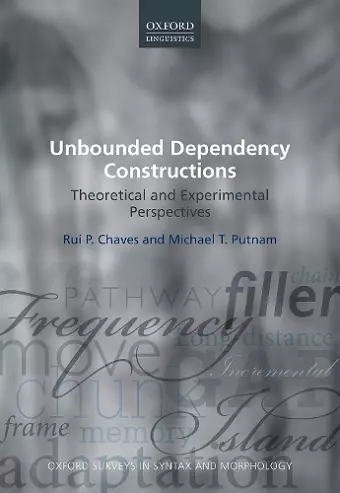Unbounded Dependency Constructions
Theoretical and Experimental Perspectives
Michael T Putnam author Rui P Chaves author
Format:Hardback
Publisher:Oxford University Press
Published:15th Dec '20
Currently unavailable, and unfortunately no date known when it will be back
This hardback is available in another edition too:
- Paperback£37.99(9780198785002)

This book is about one of the most intriguing features of human communication systems: the fact that words that go together in meaning can occur arbitrarily far away from each other. In the sentence This is technology that most people think about, but rarely consider the implications of, the word 'technology' is interpreted as if it were simultaneously next to the words 'about' and 'of'. This kind of long-distance dependency has been the subject of intense linguistic and psycholinguistic research for the last half century, and offers a unique insight into the nature of grammatical structures and their interaction with cognition. The constructions in which these unbounded dependencies arise are remarkably difficult to model and come with a rather puzzling array of constraints that have often defied characterization or proper explanation. This work provides a detailed survey of these constructions and the factors responsible for their creation and comprehension, describes new experimental evidence that sheds light on the nature of the phenomenon, and suggests new avenues for future research. The volume will be of interest to graduate students and researchers in the fields of morphosyntax, psycholinguistics, and cognitive science.
The fact that Chaves and Putnam are both arguing for certain positions and setting out a research programme makes this a work of considerable importance [...] If the book has the impact that it deserves, syntactic research will come to look rather different. Put simply, there will be more work aiming to develop analyses that can be incorporated into models of language use and more work utilizing appropriate experiments to disentangle the sources of speakers' judgements. It will be an important and very welcome change, perhaps even paradigm shift. * Robert D. Borsley, Journal of Linguistics *
In a real tour de force, Chaves and Putnam examine a wide range of unbounded dependency constructions, including some rarely noted ones, and bring to bear on them the perspectives of all the major theories of syntax, as well as language processing and language acquisition. This book should be studied by syntacticians and psycholinguists of all persuasions. * Ray Jackendoff, Tufts University and Massachusetts Institute of Technology *
Chaves and Putnam delight us with an excellent survey of one of the central topics in syntactic theory. They combine empirical depth with a broad theoretical overview, including recent processing and experimental research. Bringing together multiple perspectives, they provide an accessible and thought-provoking exposition of the debates surrounding long-distance syntactic dependencies. The synthesis is a remarkable achievement and a major step forward in our understanding of the subject. * Márta Abrusán, Institut Jean Nicod *
This book provides a beautiful, timely summary of research on unbounded dependency constructions across many constructions and languages. The authors summarize all current views, including movement-, non-movement-, memory-, and experience-based approaches, and they offer exciting new data that offers support for the experience-based view for some of these phenomena. This is an easy-to-read book that should be of interest to linguists and cognitive scientists alike. * Ted Gibson, Massachusetts Institute of Technology *
Unbounded dependency constructions have played an important role in linguistic theory for more than 50 years. In this volume, Chaves and Putnam present a comprehensive survey of this research with a large number of well-chosen examples and detailed references. This will be very useful to both established and beginning linguists. The authors compare movement-based theories such as Chomsky's Minimalist Program with non-movement-based theories which adopt Gazdar's seminal proposal to replace movement with feature percolation. The formal properties of these two types of theories are scrutinized and evaluated from the perspective of language processing and acquisition, leading to the authors' own constructivist exemplar-based model of how island constraints emerge. * Elisabet Engdahl, University of Gothenburg *
ISBN: 9780198784999
Dimensions: 255mm x 180mm x 25mm
Weight: 816g
324 pages